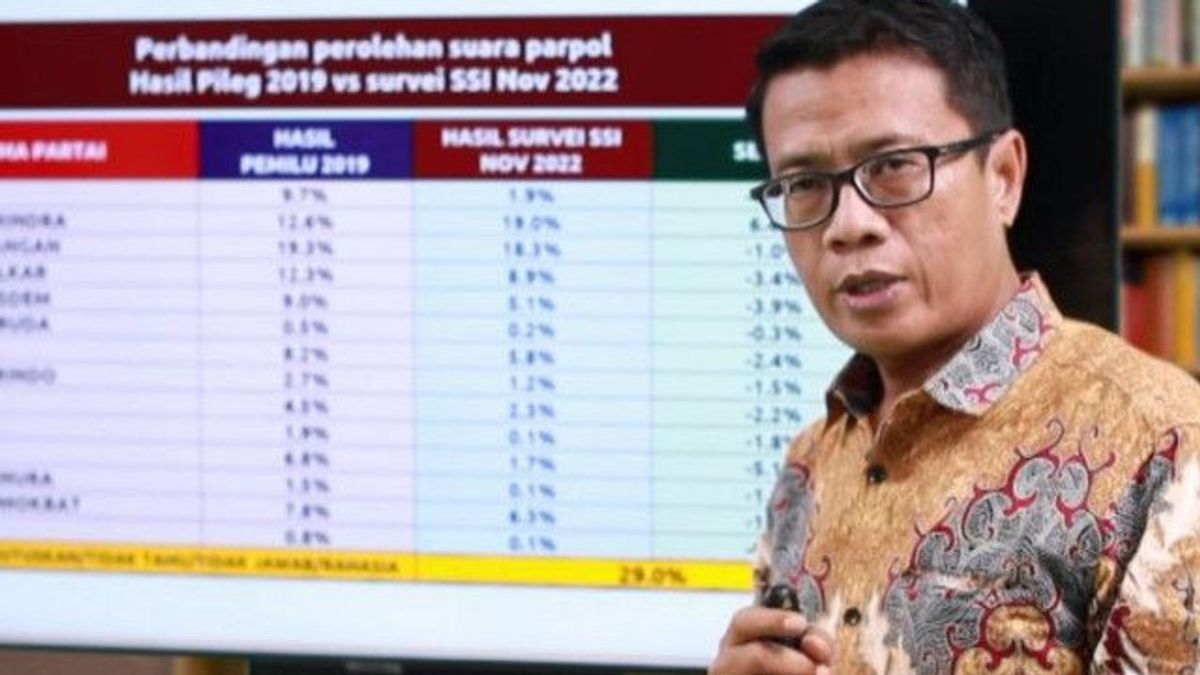JAKARTA - The results of a survey from the Indonesian Survey Scale (SSI) as of November 6, 2022, show that the electability of the Gerindra Party is in first position with 19 percent of support.
"If the legislative elections (pileg) today, their current position is in the first position with 19 percent electability," said SSI Executive Director Abdul Hakim in a written statement received in Jakarta, Friday, November 18, quoted by Antara.
Furthermore, in the next positions there are PDI-P with 18.3 percent electability, Golkar Party 8.9 percent, Democrat 6.3 percent, Prosperous Justice Party (PKS) 5.8 percent, and NasDem 5.1 percent.
Next, the United Development Party (PPP) with electability of 2.3 percent, the National Awakening Party (PKB) 1.9 percent, the National Mandate Party (PAN) 1.7 percent, Perindo 1.2 percent, Garuda 0.2 percent, the Crescent Star Party (PBB) 0.1 percent, Hanura 0.1 percent, and the Indonesian Solidarity Party (PSI) 0.1 percent.
"Meanwhile, 29 percent of those who answered they did not know or did not answer or were confidential," said the judge.
From the survey results, he continued, there are six political parties that have exceeded the 4 percent parliamentary threshold so that they can place their representatives in parliament. The six political parties are Gerindra, PDI Perjuangan, Golkar, Democrats, PKS, and NasDem.
Furthermore, the Judge highlighted the results of the survey with the results of the 2019 DPR RI Member Election. When compared to the results of the 2019 Election, only Gerindra received additional votes, which was 6.4 percent. Previously in the 2019 Election, Gerindra won 12.6 percent of the vote.
Meanwhile, other political parties experienced a decline in votes when compared to the results of the 2019 Election.
"The most vote reductions were experienced by PKB which reached 7.8 percent, from 9.7 percent of the votes in the 2019 election to 1.9 percent in this survey," he said.
The SSI survey uses a survey population consisting of all Indonesian citizens (WNI) aged 16 years and over or married when the survey takes place.
He explained that the withdrawal of survey samples used a multistage random sampling method with a base sample of 1,200 people and came from 34 provinces in Indonesia.
The survey data collection technique is face-to-face interviews using a questionnaire. Through a multilevel random withdrawal method, the base sample size of 1,200 respondents has tolerance or an error limit of about 2.83 percent at a 95 percent confidence level.
The English, Chinese, Japanese, Arabic, and French versions are automatically generated by the AI. So there may still be inaccuracies in translating, please always see Indonesian as our main language. (system supported by DigitalSiber.id)













